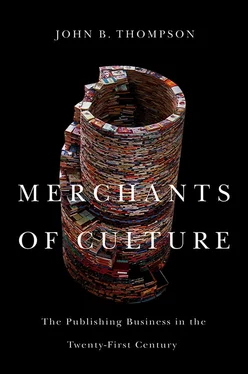Publishers possess another kind of resource that is vital to their success: intellectual capital (or what is often called intellectual property). The distinctive feature of the publishing firm is that it possesses the right to use and exploit intellectual content, to ‘publish’ or make available this content in forms that will generate a financial return. This right is regulated by the contracts it signs with authors or agents and other content-controlling sources, such as foreign publishers. Hence a publisher’s stock of contracts is potentially an extremely valuable resource, since it establishes legal entitlements to the content (or potential content) which the publisher is able to exploit. But the precise value of this resource depends on many things. The value of a contract for a particular book depends, for instance, on whether the book will actually be written and delivered in a suitable time period, how profitable the book will be (that is, what kind of revenue stream less costs, including advances, it is likely to generate) and what territorial and subsidiary rights it includes (whether it includes world rights in all languages or merely North American rights, for instance). A publisher’s stock of contracts represents the sum total of rights it possesses over the intellectual content that it seeks to develop and exploit. A contract can be a valuable resource but it can also be a liability, in the sense that it can commit the publisher to producing a book which, given the level of advance paid out and other costs incurred in producing and marketing the book, may turn out to be a loss-maker rather than a profitable proposition.
It is easy to see why publishers need economic, human, social and intellectual capital, but why do they need symbolic capital? Symbolic capital is best understood as the accumulated prestige, recognition and respect accorded to certain individuals or institutions. 3 It is one of those intangible assets that is enormously important for publishing firms. For publishers are not just employers and financial risk-takers: they are also cultural mediators and arbitrators of quality and taste. Their imprint is a ‘brand’, a marker of distinction in a highly competitive field. Publishers seek to accumulate symbolic capital just as they seek to accumulate economic capital. It is important to them partly because it is important to their image, to the way they see themselves and want to be seen by others: most publishers see themselves and want to be seen by others as organizations that publish works of ‘quality’, however that might be defined (and there are many ways that it can be). No major publisher would willingly embrace the idea that their sole purpose in life is to publish schlock (even if they accept, as some do, that they need to publish some schlock in order to do other things). But it is also important to them for good organizational and financial reasons. It strengthens their hand in the struggle to acquire new content because it makes their organization more attractive in the eyes of authors and agents: many authors want to be published by houses that have established a high reputation in their particular genre of writing, whether it is literary fiction or crime novels or biography or history. It strengthens their position in the networks of cultural intermediaries – including booksellers, reviewers and media gatekeepers – whose decisions and actions can have a big impact on the success or otherwise of particular books. A publisher who has established a reputation for quality and reliability is a publisher that agents, retailers and even readers will be more inclined to trust. And it can also translate directly into financial success: a book that wins a major literary prize will very commonly experience a sharp upturn in sales, and may even lift the sales of other books by the same author.
While symbolic capital is of considerable importance to publishing firms, it is also important to see that other players in the field, including agents and authors, can and do accumulate symbolic capital of their own. Authors can become brands in their own right – most well-known writers, like Stephen King, John Grisham, James Patterson, Patricia Cornwell, etc., are brand-name authors in this sense. They have acquired large stocks of symbolic capital and are able to use this to their advantage. In the early stages of their writing career, a publishing firm may have invested in the building of their brand, but as they become better known and develop a fan base of regular readers, the author’s brand separates off from the publisher’s brand and becomes less and less dependent on it. This puts them or their agents in an increasingly strong position when it comes to negotiating contractual terms with publishers and tends to ensure that their new books, regardless of who publishes them, are well positioned in the circuits of distribution and reception.
All five forms of capital are vital to the success of a publishing firm, but the structure of the publishing field is shaped above all by the differential distribution of economic and symbolic capital, for it is these forms of capital that are particularly important in determining the competitive position of the firm. Publishers with substantial stocks of economic and symbolic capital will tend to find themselves in a strong position in the field, able to compete effectively against others and to see off challenges from rivals, whereas firms with very small stocks of economic and symbolic capital are in a more vulnerable position. This does not mean that firms which are less well endowed will necessarily find it difficult to survive – on the contrary, the publishing field is an enormously complex domain and there are many ways in which smaller firms can compete effectively, out-manoeuvring larger players or finding specialist niches in which they can flourish. Moreover, it is important to see that economic capital and symbolic capital do not necessarily go hand in hand: a firm with small stocks of economic capital can succeed in building up substantial stocks of symbolic capital in the domains where it is active, gaining a reputation for itself that far exceeds its strength in sheer economic terms – in other words, it can punch above its weight. The accumulation of symbolic capital is dependent on processes that are very different in nature from those that lead to the accumulation of economic capital, and the possession of large quantities of one does not necessarily imply the possession of large quantities of the other.
The importance of economic and symbolic capital in the field of trade publishing can be seen in another way. For most trade publishers, the ‘value’ of a particular book or book project is understood in one of two ways: its sales or sales potential, that is, its capacity to generate economic capital; and its quality, which can be understood in various ways but includes its potential for winning various forms of recognition such as prizes and glowing reviews, or in other words, its capacity to generate symbolic capital. These are the only two criteria – there simply are no other. Sometimes the criteria go together, as in those cases when a work valued for its quality also turns out to sell well, but all too often the criteria diverge. Yet an editor or publisher may still value a work because they believe it to be good, even though they know or strongly suspect that sales will be modest at best. Both criteria are important for all publishers in the field, but the relative importance assigned to one criterion or the other varies from one editor to another, from one imprint or house to another and from one sector of the field to another. In large publishing corporations, it is not uncommon for certain imprints to be thought of as ‘commercial’ in character, that is, oriented primarily towards sales and the accumulation of economic capital, while other imprints are thought of as ‘literary’ in character, where sales are not unimportant but where the winning of literary prizes and the accumulation of symbolic value are legitimate goals in themselves.
Читать дальше












